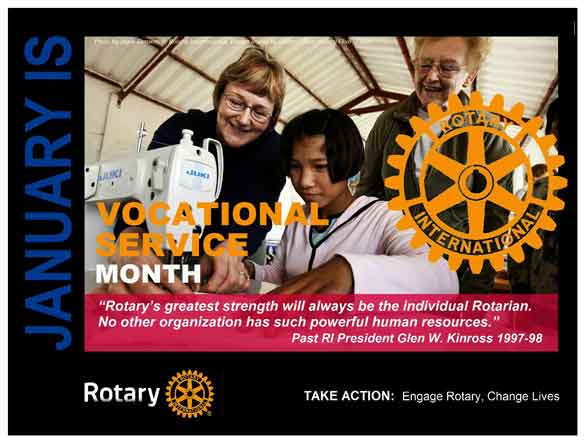
JANUARY IS VOCATIONAL SERVICE MONTH
Rotary emphasizes integrity and high ethical standards. Two standards developed by Rotarians - The Four-Way Test and the Rotarian Code of Conduct— provide a road map for ethical behavior in the workplace and other areas of life.
Rotary emphasizes integrity and high ethical standards. Two standards developed by Rotarians - The Four-Way Test and the Rotarian Code of Conduct— provide a road map for ethical behavior in the workplace and other areas of life.
THE HISTORY OF THE FOUR-WAY TEST
The Four-Way Test was conceived in 1932 by businessman Herbert J. Taylor, a member of the Rotary Club of Chicago, Illinois, who served as Rotary International president in 1954-55. Having taken on the task of saving a company from bankruptcy, Taylor developed the test as an ethical guide to follow in all business matters. The company’s survival was credited to this simple philosophy. Adopted by Rotary International in 1934, The Four-Way Test remains an essential standard against which Rotarians measure ethical behavior. It has been translated into dozens of languages and promoted by Rotarians worldwide.
ROTARIAN CODE OF CONDUCT
The Rotarian Code of Conduct provides a framework for ethical behavior that all Rotarians can use, together with The Four-Way Test, in their business and professional activities.
As part of Rotary’s guiding principles and the Avenues of Service, Vocational Service calls on Rotarians to empower others by using their unique skills and expertise to address community needs and help others discover new professional opportunities and interests.
SKILLS OR OCCUPATIONS
By including men and women from diverse professions and backgrounds, Rotary recognizes the importance of all skills and occupations. A vibrant Rotary club reflects the businesses, organizations, and professions in its community, embracing diversity in experiences and perspectives. Your professional life and vocational service go together. Rotarians have a dual responsibility: to represent their occupations within their club and to exemplify the ideals of Rotary in their places of work.
TAKE ACTION
Join a Rotarian Action Group, and support service projects around the world. These independent groups include Rotarians, family members, and Rotary program participants and alumni who have expertise in a particular field. Members advise clubs and districts and collaborate with them on service projects.
Join or form a Rotary Fellowship that’s related to your vocation. Rotary Fellowships are international groups of Rotarians, family members, and program participants and alumni who share a vocational or recreational interest. Many fellowships are related to professions, such as Editors and Publishers, Health Professionals, Lawyers, Photographers, and Police and Law Enforcement. See more at rotary.org/fellowships.
Volunteer to work on a service project, and use your vocational skills to serve others. Think about the skills that make you successful in your profession: Maybe you have training in some branch of science or medicine, are handy with tools or machinery, know how to start a business, have expertise managing finances, or can influence others through public speaking or writing. Use your unique set of talents to make a difference in your community.
Share your expertise through your district resource network. If you have technical expertise in one of Rotary’s six areas of focus — or with project planning and implementation; community assessment, measurement, and evaluation; or other important aspects of large-scale project grants — let your district international service chair know. Lend your skills to local clubs, and help develop projects with greater impact.
Participate in a vocation-related Rotary Friendship Exchange. Work with your district Rotary Friendship Exchange chair to organize an international, reciprocal exchange between two districts interested in exploring a professional field in a new cultural context. Involve young professionals, and organize activities allowing exchange participants to experience cultural immersion while exploring their field in a new environment.
ADVANCING HIGH ETHICAL STANDARDS IN THE WORKPLACE
As leaders in businesses and professions, Rotarians can advance high ethical standards by setting a positive example among colleagues and in their community. Here are a few specific ways Rotarians integrate ethics into their daily work life:
- Discuss and emphasize honesty, accountability, fairness, integrity, and respect when hiring, training, and supervising employees
- Praise and encourage the exemplary behavior of colleagues
- Demonstrate personal commitment to high ethical standards in relations with customers, vendors, and business associates, treating each business
interaction with care and consideration
- Promote socially and environmentally responsible practices in your businesses and organizations
TAKE ACTION
- Educate current and new club members. Dedicate time to discussing the importance of The Four-Way Test and the Rotarian Code of Conduct.
- Discuss ethical dilemmas. Organize a workshop or interactive activity to discuss ethical resolutions to challenging scenarios.
- Recognize those who do good. Honor businesses or professionals that demonstrate high ethical standards.
- Engage young people. Mentorship opportunities allow you to share your knowledge and guide youth in building a successful future. Consider
conducting workshops or hosting professional development seminars.